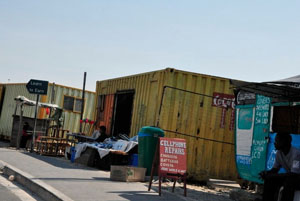As a budding business reporter of Ugandan origin, I find the gaps in reporting on Africa and other emerging markets a little too glaring, even at a time of renewed global interest in the business potential of those areas.
In my quest to find what opportunities these new markets open up for business journalists in the U.S. and other parts of the developing world, I reached out to Peter Wonacott, The Wall Street Journal’s bureau chief in Africa.
Before stepping into his current role, Wonacott covered the stock market for Dow Jones Newswires in Shenzhen, China and worked as a bureau chief in Beijing. He also worked in Hong Kong, and New Delhi, India covering South Asia for the Journal.
Wonacott said there is a lot of interest, but not a lot of understanding about Africa.
“Those of us on the ground have the privilege and the responsibility of being honest tellers of the story,” he said.
Some would say there is a new scramble for Africa. Would you say the same?
There’s certainly a new scramble. There are really two separate scrambles but they are related. The first scramble is for resources and you see that with the rise and emergence of China and India’s economies. Their factories and consumers need the minerals, oil and gas that Africa has. India and Chinese companies are in here as well as the Western energy companies that have long been here – the French, the British and the American.
There is a scramble, not only for oil and gas but minerals and agricultural commodities. There is a lot of concern about food security, and Africa is also a place that can grow the things that feed countries that don’t have a lot of arable land. But there is also a scramble for it’s consumers and that’s the fresher development.
The scramble for resources and the scramble for consumers are related because resources are what has helped fuel Africa’s growth. The exports to China to India have really helped raise income levels and in turn created this new consumer class. When you have a new consumer class especially one that is potentially a billion consumers, then you have a lot of interest from multinational corporations and entrepreneurs outside and inside Africa. And the governments are becoming a little bit more sophisticated as to how to cultivate and encourage economic growth at home.
Does this new interest in Africa and other parts of the developing world provide new opportunities for business reporters?
I think Africa is a big emerging economic story. It’s a place that will reward young, hungry, ambitious journalists because there are a lot more stories than there are journalists that can tell these stories.
There is definitely much more demand for Africa business news than just a couple years ago, even a year ago. That’s because people have seen what happened in China and Indian and they don’t want to miss out on what happens in Africa. And to figure out what’s going on in Africa, you do need people on the ground, writing about the companies that are here, the economies and how they are changing and who the movers and shakers are.
There’s definitely demand. The problem is sometimes with the supply. News organizations are facing their own budget constraints and so not all of them have been able to beef up to meet this demand. There is just much more interest than before on what multinational corporations are dong in Africa. Who is succeeding? Who is failing, and why?
So how does one jump in?
There are many paths to covering business news in Africa. One would be to look at newswires. That’s where those organizations like Reuters, Bloomberg, Dow Jones and AFP (Agence France Presse) tend to have a lot of boots on the ground and they are doing more economic news coverage of Africa. So it might be looking at where these organizations need people, and it always helps to have a local language – whether it’s French or Swahili or Zulu – to be able to report on the ground and to meet with entrepreneurs and not just foreign executives.
The other option is to cover Africa from New York sort of a front tier market strategy covering funds and investors that are going into Africa or covering the energy companies that are there, and you can do that from New York or London or other capitals. But ideally if you are interested in covering business in Africa, you should look for a way to get into Africa and do it from the ground.
The other way is as a freelancer although that’s a difficult road these days with the budget environment with newspapers.
What is the best way to cover multinational corporations and their activities abroad?
The best way is to do it from the inside out. To first of all figure out what companies have the biggest investments in the country; that seem to have the most novel business strategies to that country; that are doing surprisingly well or surprisingly bad. And then get inside and meet with these executives, maybe go to their plants or meet with their people in the field and figure out what the story is.
Maybe the story is a product, a person, a change in direction or a shift on focus. There is no other way about it, trying to write about companies from the outside or from the local business press. It’s never going to be too insightful or helpful for your readers.
Anything in particular that journalists should be aware of when covering western businesses in the developing world?
If you are looking for critical stories of companies, you want to see whether they are doing things in other countries that they wouldn’t do at home. Are they polluting? Are they engaging in practices that they wouldn’t do back in the U.S. because it’s unethical or illegal?
But you don’t want to always look for the conspiracies and the skeletons in the closet. There are a lot of really interesting positive stories that businesses can tell as well, but if you go in trying always to get the worst possible story about the company, these executives are not going to open up and you’re usually not going to get a very good story. So if you are committed to business coverage, go in there with an open mind and just look for interesting, engaging stories whether they are good or bad or reflect critically or positively on the company.
How does one make such a story relevant to a local audience?
If you are writing for an American audience, the important thing is to stay in touch what what’s going on in the U.S., that you see connections between what’s happening in Africa and what’s happening in the U.S. At The Wall Street Journal, we figure that we are writing for a really engaged, smart educated person who also happens to be interested in Africa, but may not know much, if anything about Africa.
We try to make our writing clear and our background and context just sharp enough to give what they need to know to make the story relevant. We really don’t see ourselves writing exclusively for the U.S. audience. I think it just underscores the importance of making sure that our news is relevant and fair, credible and our writing is as sharp and as concise as possible to appeal to people in Bangkok or Brussels or Boston.
What challenges should a business journalist expect if they are to cover emerging markets?
The fun thing about covering emerging markets is that they are full of unexpected challenges. I think they are emerging because they are rough places for both companies and journalists. They are full of rewards and full of risks.
There is not a lot of up-to-date information that’s published, so you need to get a lot of it through your own reporting, and sometimes that entails talking to officials that may not say something truthful either because they are trying to cover something up, or they just don’t know and give you a wrong answer. You have to really look at things three or four times and crosscheck them before you publish them. It’s essential.
The main thing is reporters have to be enterprising; they have to go after stories rather than waiting for stories to come to them. The other thing is just traveling and getting around, it’s not like traveling around the U.S. And you have to know how to take a punch. I don’t mean that literally. There are health issues here; you can get all your reporting equipment stolen. You have to pace yourself up after these things happen and just learn how to keep going and appreciate that you are on top of a big story in the middle of historic change.










